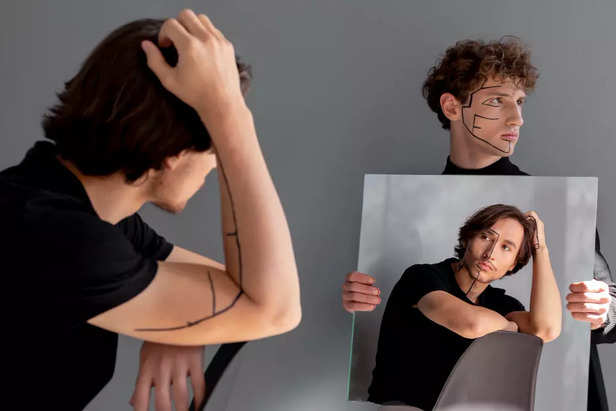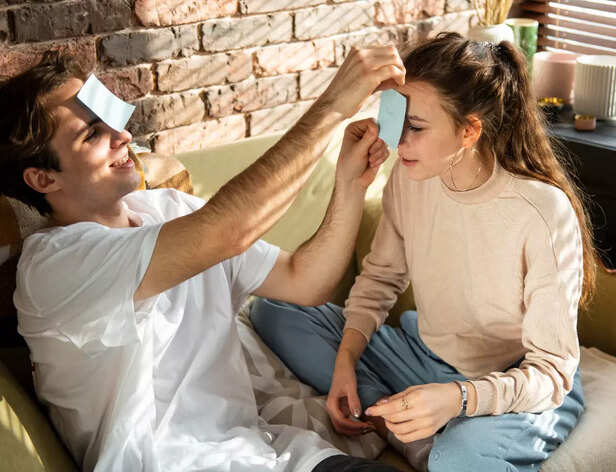Social Media’s Big Lie: What Happens When The Filters Come Off?
Shumaila Siddiqui | Wed, 26 Mar 2025
Social media filters create unrealistic beauty standards, affecting self-esteem and mental health. Many struggle with self-doubt and anxiety due to constant comparison with edited images. Relationships also suffer as people present idealized versions of themselves online. However, a shift toward authenticity is growing, with trends like #NoFilter promoting self-acceptance. Balancing digital enhancements with reality fosters confidence and stronger connections.

Photo:
Social media has changed the way we communicate and share our lives. It allows self-expression but also creates unrealistic standards. Filters and editing tools make perfection seem normal, affecting how people see themselves. This article explores the impact of social media filters, the growing trend of authenticity, and how relationships are affected in the digital era.
With the rise of photo and video editing apps, people can alter their appearance within seconds. Social media feeds are filled with flawless images that set unrealistic expectations. While these tools can be fun, they often contribute to self-doubt and low self-esteem. Many users feel pressure to maintain an idealized online persona, leading to emotional stress. The obsession with presenting a perfect digital identity affects personal and professional relationships. It is essential to recognize this growing concern and find ways to embrace authenticity.

Filters enhance images by brightening skin, reshaping features, and adding effects. They boost confidence but also promote unrealistic beauty standards. People often compare themselves to altered images, leading to self-doubt and anxiety.
Many social media platforms encourage the use of filters, making it easy to present a perfected version of oneself. While this can be fun and engaging, it often blurs the line between reality and fantasy. Over time, people may struggle with self-acceptance when they feel their real-life appearance does not match their online persona.
Excessive filter use can harm mental health. Studies link filters to lower self-esteem and body dissatisfaction. Seeing flawless images online creates pressure to look perfect. This can lead to anxiety, depression, and even social withdrawal.
"Snapchat dysmorphia" is a growing concern. Many seek cosmetic procedures to match their filtered selfies. This widens the gap between digital beauty and real-life appearance, causing emotional distress. Over-reliance on filters can create a distorted self-image, making it difficult to appreciate natural beauty.
Constant exposure to digitally altered images also affects how people perceive beauty in others. It raises expectations and fosters unrealistic beauty norms. As a result, many feel inadequate and try to meet impossible standards. The constant cycle of comparison can lead to feelings of isolation and dissatisfaction with one's own life.

Social media does not just affect individuals—it also impacts relationships. Many people present an idealized version of their lives, showing only the best moments while hiding struggles and imperfections. This can create unrealistic expectations in romantic relationships, friendships, and even family dynamics.
Couples may feel pressured to appear perfect online, leading to stress and misunderstandings. The curated reality of social media can make people feel insecure about their own relationships when they compare them to seemingly flawless couples online. Communication gaps can also arise when people prioritize online validation over genuine connection.

Filters not only change personal appearance but also influence how relationships function. Many people use filters to present a flawless version of themselves at the beginning of a relationship. However, when the filters come off—both digitally and emotionally—reality sets in.
Partners who have built their attraction based on altered images may face disappointment when they see the real person behind the screen. This can lead to conflicts, trust issues, or a lack of acceptance. The expectation of online perfection can create dissatisfaction in relationships, making genuine connections harder to maintain.
Moreover, social media often portrays an idealized version of love. Couples post happy, edited pictures, hiding conflicts and struggles. This unrealistic portrayal makes others feel their own relationships are lacking, increasing insecurity and emotional distance.
Friendships also suffer when digital facades replace real interactions. People may feel disconnected when they realize their online friends are different in real life. The pressure to maintain a perfect online presence can prevent deep, honest conversations, weakening relationships over time.
Some relationships even break apart when reality does not match online personas. Partners who rely on filters may struggle with self-confidence in real-life interactions. Trust issues arise when people feel deceived by exaggerated or altered online portrayals. This affects emotional bonding and long-term compatibility.
Additionally, relationships built on social media often face challenges when transitioning into real-life interactions. The confidence that comes from filters and online validation can fade when faced with unfiltered reality. This can lead to insecurity and communication issues, making it difficult to sustain long-term connections.

A shift toward authenticity is emerging. Influencers and users now embrace unedited, real-life content. The #NoFilter movement is gaining popularity. People post raw images to promote self-acceptance.
“Get Ready With Me” (GRWM) videos are trending, showcasing unfiltered daily routines. This makes content more relatable and engaging. Many influencers openly discuss their struggles with self-image, helping others feel less alone.
More platforms now support authenticity. Instagram has introduced features like the “Take a Break” reminder, encouraging mindful social media use. The growing trend of digital detoxes also highlights the need for balance between online and offline life.
Consumers prefer brands that showcase real experiences over polished ads. Companies now use unfiltered images and real testimonials to build trust.
Authentic influencers gain more followers. Those who share struggles and unedited moments create stronger connections. Transparency is becoming a key factor in social media influence. Many brands now collaborate with creators who promote body positivity and mental well-being.
Even celebrities are embracing authenticity. More public figures now post makeup-free selfies, behind-the-scenes glimpses, and unfiltered stories. This shift is changing how beauty and lifestyle are portrayed online.

Filters are not bad, but excessive use can harm self-perception. Finding a balance is essential.
Understanding social media’s impact is crucial for mental well-being. Schools and parents should educate young users about digital literacy. Recognizing the difference between real and edited content helps individuals make informed choices.
Several organizations now promote mental health awareness related to social media use. Campaigns encourage users to embrace authenticity and take breaks from digital spaces. Awareness about the psychological effects of filters can help people build a healthier relationship with social media.
Social media blurs the line between reality and perfection. While filters create flawless images, authenticity is gaining momentum. Real faces over digital enhancements lead to better self-esteem and stronger relationships.
Being mindful of the difference between digital and real life helps create healthier connections. Choosing authenticity over perfection fosters a more positive and genuine social media space. By valuing unfiltered experiences, people can strengthen relationships and boost self-confidence. Ultimately, balancing digital enhancements with reality is key to a healthier online experience.
Unlock insightful tips and inspiration on personal growth, productivity, and well-being. Stay motivated and updated with the latest at My Life XP
With the rise of photo and video editing apps, people can alter their appearance within seconds. Social media feeds are filled with flawless images that set unrealistic expectations. While these tools can be fun, they often contribute to self-doubt and low self-esteem. Many users feel pressure to maintain an idealized online persona, leading to emotional stress. The obsession with presenting a perfect digital identity affects personal and professional relationships. It is essential to recognize this growing concern and find ways to embrace authenticity.
The Allure of Filters

Body Reshaping features
Filters enhance images by brightening skin, reshaping features, and adding effects. They boost confidence but also promote unrealistic beauty standards. People often compare themselves to altered images, leading to self-doubt and anxiety.
Many social media platforms encourage the use of filters, making it easy to present a perfected version of oneself. While this can be fun and engaging, it often blurs the line between reality and fantasy. Over time, people may struggle with self-acceptance when they feel their real-life appearance does not match their online persona.
Psychological Impact of Filters
"Snapchat dysmorphia" is a growing concern. Many seek cosmetic procedures to match their filtered selfies. This widens the gap between digital beauty and real-life appearance, causing emotional distress. Over-reliance on filters can create a distorted self-image, making it difficult to appreciate natural beauty.
Constant exposure to digitally altered images also affects how people perceive beauty in others. It raises expectations and fosters unrealistic beauty norms. As a result, many feel inadequate and try to meet impossible standards. The constant cycle of comparison can lead to feelings of isolation and dissatisfaction with one's own life.
Social Media and Relationships

Impacts Relationship
Social media does not just affect individuals—it also impacts relationships. Many people present an idealized version of their lives, showing only the best moments while hiding struggles and imperfections. This can create unrealistic expectations in romantic relationships, friendships, and even family dynamics.
Couples may feel pressured to appear perfect online, leading to stress and misunderstandings. The curated reality of social media can make people feel insecure about their own relationships when they compare them to seemingly flawless couples online. Communication gaps can also arise when people prioritize online validation over genuine connection.
The Reality Behind Filters in Relationships

Trust issues in relationship
Filters not only change personal appearance but also influence how relationships function. Many people use filters to present a flawless version of themselves at the beginning of a relationship. However, when the filters come off—both digitally and emotionally—reality sets in.
Partners who have built their attraction based on altered images may face disappointment when they see the real person behind the screen. This can lead to conflicts, trust issues, or a lack of acceptance. The expectation of online perfection can create dissatisfaction in relationships, making genuine connections harder to maintain.
Moreover, social media often portrays an idealized version of love. Couples post happy, edited pictures, hiding conflicts and struggles. This unrealistic portrayal makes others feel their own relationships are lacking, increasing insecurity and emotional distance.
Friendships also suffer when digital facades replace real interactions. People may feel disconnected when they realize their online friends are different in real life. The pressure to maintain a perfect online presence can prevent deep, honest conversations, weakening relationships over time.
Some relationships even break apart when reality does not match online personas. Partners who rely on filters may struggle with self-confidence in real-life interactions. Trust issues arise when people feel deceived by exaggerated or altered online portrayals. This affects emotional bonding and long-term compatibility.
Additionally, relationships built on social media often face challenges when transitioning into real-life interactions. The confidence that comes from filters and online validation can fade when faced with unfiltered reality. This can lead to insecurity and communication issues, making it difficult to sustain long-term connections.
The Rise of Authenticity

Self Acceptance
A shift toward authenticity is emerging. Influencers and users now embrace unedited, real-life content. The #NoFilter movement is gaining popularity. People post raw images to promote self-acceptance.
“Get Ready With Me” (GRWM) videos are trending, showcasing unfiltered daily routines. This makes content more relatable and engaging. Many influencers openly discuss their struggles with self-image, helping others feel less alone.
More platforms now support authenticity. Instagram has introduced features like the “Take a Break” reminder, encouraging mindful social media use. The growing trend of digital detoxes also highlights the need for balance between online and offline life.
Impact on Brands and Influencers
Authentic influencers gain more followers. Those who share struggles and unedited moments create stronger connections. Transparency is becoming a key factor in social media influence. Many brands now collaborate with creators who promote body positivity and mental well-being.
Even celebrities are embracing authenticity. More public figures now post makeup-free selfies, behind-the-scenes glimpses, and unfiltered stories. This shift is changing how beauty and lifestyle are portrayed online.
Finding the Right Balance

Emotional connection
Filters are not bad, but excessive use can harm self-perception. Finding a balance is essential.
- Follow positive creators who promote authenticity.
- Use filters wisely, focusing on creativity over unrealistic transformations.
- Embrace self-love and accept natural beauty.
- Limit social media comparisons to avoid unrealistic expectations.
- Prioritize real-world interactions over online approval.
- Communicate openly in relationships and focus on emotional connection rather than digital perfection.
- Practice digital detoxing by taking breaks from social media to improve mental clarity.
- Encourage self-expression beyond filters, such as creative photography and genuine storytelling.
- Educate younger users about the impact of filters and social media illusions to foster healthy self-esteem.
The Role of Digital Awareness
Several organizations now promote mental health awareness related to social media use. Campaigns encourage users to embrace authenticity and take breaks from digital spaces. Awareness about the psychological effects of filters can help people build a healthier relationship with social media.
In a Nutshell
Being mindful of the difference between digital and real life helps create healthier connections. Choosing authenticity over perfection fosters a more positive and genuine social media space. By valuing unfiltered experiences, people can strengthen relationships and boost self-confidence. Ultimately, balancing digital enhancements with reality is key to a healthier online experience.
Unlock insightful tips and inspiration on personal growth, productivity, and well-being. Stay motivated and updated with the latest at My Life XP










